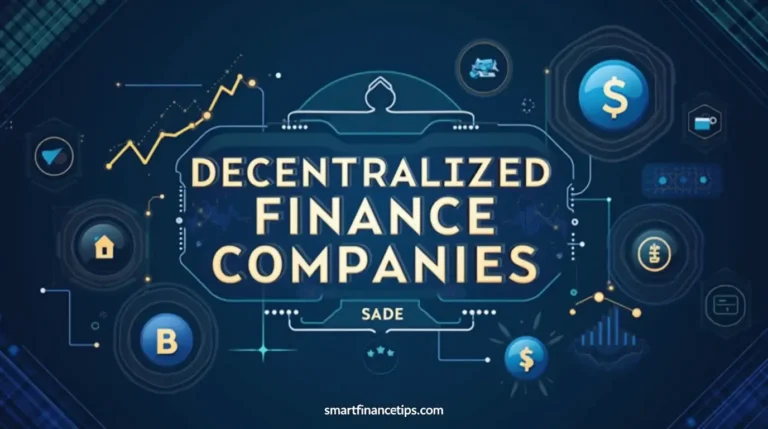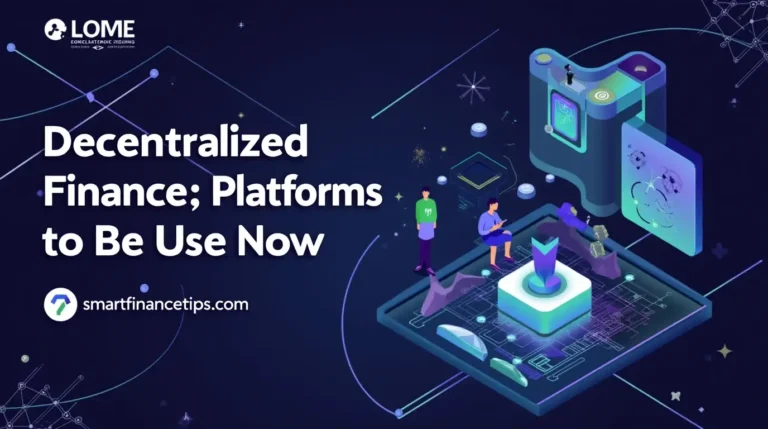The Best Fluffy Pancakes recipe you will fall in love with. Full of tips and tricks to help you make the best pancakes.
Table of Contents
Introduction to Decentralized Finance (DeFi)

decentralized finance development company
Decentralized finance, commonly referred to as DeFi, represents a significant shift in the financial landscape by utilizing blockchain technology to recreate traditional financial systems in a decentralized format. At its core, DeFi aims to provide open access to financial services such as lending, borrowing, trading, and insurance without the need for intermediaries like banks or brokers. One of the primary principles of DeFi is transparency, as all transactions are recorded on a public blockchain, allowing participants to verify actions and data without relying on a central authority.
The technological foundation of DeFi is built on blockchain and smart contracts. decentralized finance companies; Blockchain technology enables secure and immutable records of transactions, while smart contracts are self-executing contracts with the terms of the agreement directly written into code. This combination facilitates trustless interactions between parties, reducing the risk of fraud and ensuring that agreements are honored under predetermined conditions. Through mechanisms such as liquidity pools and decentralized exchanges, users can trade assets directly from their wallets, effectively eliminating traditional middlemen.
As DeFi continues to grow, its platforms have emerged as alternatives to conventional financial institutions. The rise of these platforms has empowered individuals by providing them with greater control over their financial assets, lower transaction costs, and enhanced accessibility. Furthermore, DeFi applications have attracted significant investment and interest, driving innovation at an unprecedented pace. The ability to access financial services globally without the restrictions of central authorities highlights the revolutionary potential of DeFi and its promise to democratize finance for users worldwide.
The Importance of Choosing the Right Development Company
In the realm of decentralized finance (DeFi), the selection of a development company is a critical decision that can significantly influence the trajectory and success of a project. The fast-evolving nature of the DeFi landscape necessitates a development partner with a robust understanding of blockchain technology, smart contracts, and the specific challenges unique to DeFi applications. A competent development team not only ensures that the project is scalable and secure but also focuses on its overall functionality and time-to-market.
When choosing a development company for your DeFi project, it is essential to assess their portfolio and previous experience in the blockchain sector. Successful projects, such as Uniswap and Compound, demonstrate the importance of partnering with a knowledgeable team that can navigate the complex regulatory environment while delivering high-performance solutions. These projects benefited from skilled developers who understood user experience, security audits, and compliance measures, which added value and trust to their platforms.
Conversely, projects that suffered setbacks often cited poor choices in their development teams as a primary reason for their struggles. For instance, the infamous case of the DAO hack showcased how a lack of due diligence in selecting a capable development partner could lead to vulnerabilities, resulting in the loss of significant funds and credibility. Such instances underscore the necessity of thorough vetting in the selection process.
Furthermore, the right development company can also influence a project’s time-to-market, which is vital in a competitive landscape. An effective team will employ agile methodologies, enabling rapid iterations and adjustments based on real-time feedback. This responsiveness can be the difference between leading the market and being left behind.
In essence, the successful execution of a DeFi project heavily relies on choosing a development company that aligns with your vision, capabilities, and values. The right partner can provide the technical expertise and strategic insight required to navigate the complexities of decentralized finance effectively.
Key Features to Look for in a DeFi Development Company

When selecting a decentralized finance (DeFi) development company, it is essential to consider several key features that can significantly impact the success of your project. First and foremost, expertise in blockchain technology is paramount. The company should demonstrate a strong understanding of various blockchain platforms and protocols, showcasing their ability to develop secure, scalable, and efficient DeFi solutions. This expertise enables them to leverage the unique strengths of different blockchains, ensuring that your project benefits from the best available technology.
Another critical attribute is experience in the financial services sector. A DeFi development company with a solid background in finance will be better equipped to understand the intricacies of financial products and services. Such experience helps in creating DeFi applications that are not only functional but also align with user expectations and market demands. Consequently, look for a team that has worked on similar projects, which can also help prevent common pitfalls encountered during development.
Knowledge of regulatory compliance is also vital for any DeFi development partner. The rapidly evolving landscape of decentralized finance brings an array of legal challenges that require adept navigation. A competent company should be familiar with relevant regulations and be able to guide you through the compliance process, ensuring that your application adheres to applicable laws while minimizing legal risks.
A strong portfolio showcasing past projects is an excellent indicator of a company’s capabilities. By reviewing their previous work, you can assess their design style, technical proficiency, and ability to deliver on time. Lastly, consider the company’s capability for ongoing support and maintenance. The dynamic nature of the DeFi space necessitates continuous updates and improvements to adapt to changing market conditions and technological advancements. Opt for a development partner that offers comprehensive post-launch support, ensuring your DeFi application remains robust and competitive.
Different Types of DeFi Solutions and Their Development Needs
Decentralized Finance (DeFi) has emerged as a transformative force in the financial ecosystem, offering innovative solutions across various sectors. Understanding the different types of DeFi solutions is crucial for selecting the appropriate development company that can address specific project needs. Common DeFi solutions include lending platforms, decentralized exchanges (DEXs), stablecoins, and yield farming protocols, each with unique requirements and functionalities.
Lending platforms, for instance, facilitate the borrowing and lending of assets without the need for traditional financial intermediaries. These platforms require robust smart contracts to automate transactions securely. Additionally, they need user-friendly interfaces and extensive security measures to guard against potential vulnerabilities. A proficient development company will focus on crafting a reliable backend infrastructure and ensuring seamless user experience.
Decentralized exchanges are another prominent category within the DeFi landscape. These platforms enable users to trade cryptocurrencies directly with one another, eliminating the need for central authority. The development of DEXs necessitates advanced liquidity solutions, transaction speed optimization, and strong governance models. Firms specializing in DeFi development must have expertise in blockchain technology and an understanding of market dynamics to successfully launch a DEX.
Stablecoins serve to bridge the volatility gap common in cryptocurrencies by pegging their value to traditional assets like the dollar or euro. Development teams focusing on stablecoin solutions must ensure accurate value stabilization mechanisms and compliance with regulatory standards. This requires thorough understanding of both smart contract development and traditional financial systems.
Lastly, yield farming protocols allow users to earn returns on their assets through various mechanisms. These platforms are intricately linked to liquidity provision and often necessitate complex reward structures. A development company involved in creating yield farming solutions must be well-versed in tokenomics and smart contract interaction to create effective and sustainable models.
Evaluating a DeFi Development Company’s Expertise

When selecting a decentralized finance (DeFi) development company, it is crucial to evaluate their expertise thoroughly. Start by checking the company’s credentials, including their experience in the DeFi space and any relevant certifications they hold. Reputable firms will often showcase their qualifications prominently on their website, providing potential clients with insight into their qualifications and specialization.
Next, reviewing past projects is an essential part of the evaluation process. A reliable DeFi development company should have a portfolio that reflects their range of capabilities, showcasing successful projects that align with the services you require. Take the time to analyze the complexity and functionality of these projects, as well as any innovative solutions they may have implemented. This will give you a clearer understanding of their technical proficiency and the value they can bring to your specific project.
Client feedback also plays a significant role in determining a company’s expertise. Look for testimonials or case studies from previous clients, as these resources provide valuable insights into the company’s performance and the level of satisfaction their clients experienced. Asking for references and directly contacting past clients can further clarify the company’s reliability and responsiveness throughout the development process.
Finally, industry recognition or certifications can serve as indicators of a DeFi development company’s stature within the community. Awards, accolades, and partnerships with well-known players in the blockchain space often signify a company’s commitment to excellence and innovation. These factors combined create a comprehensive picture of the firm’s expertise, enabling you to make an informed decision when selecting a DeFi development partner.
Understanding the Development Process of DeFi Applications
The development of decentralized finance (DeFi) applications involves a systematic approach, typically structured into several key stages: ideation, planning, design, development, testing, and deployment. Each of these stages plays a critical role in creating functional and secure DeFi solutions that cater to the needs of users in the ever-evolving financial landscape.
The first stage, ideation, is where innovative concepts are generated based on market demands and potential use cases. This step is crucial as it sets the foundation for the entire project. During ideation, teams brainstorm ideas, evaluate existing solutions, and analyze user feedback to identify gaps in the market. The challenge here often lies in translating complex financial concepts into clear, user-friendly applications that foster mass adoption.
Following ideation is the planning stage, which encompasses outlining the project scope, defining requirements, and drafting a roadmap. This phase involves working with stakeholders to establish timelines, budgets, and resource allocation. Proper planning is essential as it helps to anticipate potential roadblocks and allows teams to devise strategies to mitigate risks that may arise during development.
The design phase involves creating wireframes and user interface prototypes that showcase the application’s layout and functionality. Designers must focus on usability and aesthetics, ensuring that the end product attracts and retains users. An essential challenge in this stage is balancing innovative design with ease of use, ensuring that users, regardless of their technical background, can navigate the application seamlessly.
Next is the development phase, where the actual coding takes place. This segment requires specialized knowledge of blockchain technology and smart contracts. Developers work diligently to build the application’s functionality while adhering to security best practices to prevent vulnerabilities. It is common for challenges to emerge here, often related to integration with existing systems and ensuring scalability.
Testing follows development, where rigorous quality assurance protocols are implemented to identify and fix bugs. This stage is critical for maintaining user safety and trust in the platform. Various testing methods, such as unit testing, integration testing, and user acceptance testing, are employed to ensure the application meets all functional and security criteria.
Finally, the deployment stage involves launching the application to the public and ensuring that it operates as intended in a live environment. Post-launch support is also crucial, as developers need to monitor performance, address any emerging issues, and roll out updates as necessary. Each slice of this development process contributes to the overall success and reliability of DeFi applications, making it vital for development teams to navigate these stages effectively.
Funding and Budgeting for Your DeFi Project

When launching a decentralized finance (DeFi) project, meticulous planning of funding and budgeting is crucial for success. The financial landscape of DeFi can be complex, and understanding the various components involved will enable project leaders to allocate resources efficiently. Initially, it is essential to estimate development costs, which can include hiring skilled blockchain developers, auditors, and legal consultants to ensure the project complies with regulatory guidelines.
Beyond development costs, ongoing operation expenses also need to be factored into the budget. These may include server costs, maintenance fees, and employee salaries that can incur over time. Additionally, marketing expenses must be considered, as promoting a DeFi project is essential to attract users and investors alike. Budgeting for effective marketing strategies, such as social media campaigns, influencer partnerships, and community engagement, can significantly impact the project’s visibility and success.
Another essential aspect to consider is licensing fees, especially if the project operates within certain regulated jurisdictions. Compliance with local laws can also lead to potential costs, and early engagement with legal advisors may help navigate these complexities effectively. To bolster the project financially, exploring various funding options is key. Many DeFi startups turn to traditional venture capital, crowdfunding, or token sales, each offering a distinct approach to raising capital.
Engaging effectively with investors is critical for securing funding. This involves developing a clear and compelling pitch that outlines the value proposition of the DeFi project, its unique features, and the potential return on investment. Demonstrating a well-researched business model, showcasing exemplary technology implementation, and providing a roadmap for growth are essential elements to build investor confidence.
Regulatory Considerations in DeFi Development
Decentralized Finance (DeFi) represents a monumental shift in the financial landscape, leveraging blockchain technology to enable peer-to-peer transactions without the need for intermediaries. However, as this innovative sector rapidly evolves, it operates within a complex regulatory framework that developers must navigate effectively. Understanding the legal landscape surrounding DeFi is crucial for any development company seeking to create compliant and sustainable financial solutions.
Regulations regarding DeFi projects can differ significantly by jurisdiction. In some countries, regulatory bodies have implemented clear guidelines governing cryptocurrencies and decentralized applications, while others are still grappling with how to address this novel financial paradigm. For instance, jurisdictions like the United States have seen their regulatory bodies, such as the Securities and Exchange Commission (SEC), actively scrutinizing DeFi projects to determine whether they fall under existing securities laws. Consequently, it is vital for development companies to possess a thorough understanding of the applicable regulations in the regions where they intend to operate.
Moreover, the regulatory environment concerning DeFi is continuously evolving. This constant change means that development companies must remain vigilant and proactive in staying updated on new laws and amendments that could affect their projects. Non-compliance can lead to severe legal repercussions, including fines, project shutdowns, or potential criminal liabilities. Therefore, partnering with a development company that prioritizes regulatory compliance not only enhances trustworthiness but also safeguards the project’s long-term viability.
In summary, regulatory considerations play a critical role in DeFi development. A knowledgeable development company is essential to navigate the landscape effectively. Ensuring compliance with local laws not only mitigates risks but also paves the way for innovation and growth within the decentralized finance sector.
Conclusion: Making an Informed Decision for Your DeFi Development Needs
In the rapidly evolving landscape of decentralized finance (DeFi), selecting the right development company is more crucial than ever. As this sector matures, understanding the multitude of choices available can empower stakeholders to make informed decisions that align with their business objectives. Throughout this guide, we have examined various aspects that should be considered when selecting a DeFi development partner, including technical expertise, experience, project portfolios, and client testimonials.
The significance of conducting thorough research cannot be overstated. Engaging with a development company that demonstrates a strong grasp of both blockchain technology and DeFi solutions will ensure that your project meets industry standards and regulatory requirements. It is essential to assess a company’s familiarity with your specific requirements, as well as their adaptability and willingness to engage in meaningful dialogue. By fostering a collaborative relationship, you can effectively communicate your vision and expectations, leading to a more successful outcome.
Moreover, evaluating the team’s qualifications and capabilities can provide insights into their ability to deliver quality results. This includes reviewing their previous work, especially their past DeFi projects, as well as understanding their development methodologies and tools. Take the time to ask critical questions that address your project’s unique challenges and goals.
Ultimately, the right DeFi development company can greatly influence the success of your project. By weighing the factors discussed and emphasizing the importance of comprehensive due diligence, you can forge a partnership that not only brings your DeFi vision to life but also contributes to the advancement of the financial ecosystem at large. Making an informed decision will help minimize risks and set the stage for sustainable growth and innovation within this exciting domain.
ai monetization artificial intelligence behavioral economics blogging guide bubble cryptocurrency budgeting strategies budget management business business days business license business plan business plans cryptocurrency creation debt management debt strategies decentralized finance earn money finance development financial app financial planning fintech services freelance business freelancing business home earnings investment methods investment stocks invest stocks marketing services money blogging money management money online personal budget personal budgeting personal data personal finance real estate remote work side business small business start start business stock investment stock market stock trading successful businesses
decentralized finance development company the best now in 2025
Decentralized finance, commonly referred to as DeFi, represents a significant shift in the financial landscape by utilizing blockchain technology to recreate traditional financial systems in a decentralized format. At its core, DeFi aims to provide open access to financial services such as lending, borrowing, trading, and insurance without the need for intermediaries like banks or brokers. One of the primary principles of DeFi is transparency, as all transactions are recorded on a public blockchain, allowing participants to verify actions and data without relying on a central authority.








